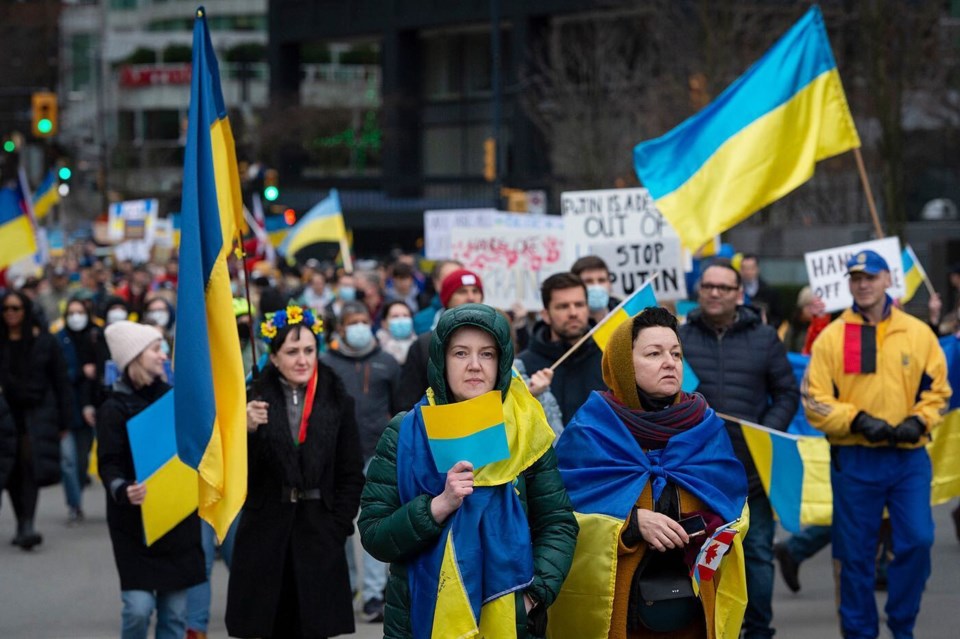West Vancouver’s Jaime Webbe is half a world away from rocket attacks that have hit residential neighbourhoods in Ukraine and the steady stream of refugees who are fleeing the war-ravaged country.
But as head of the – a 76-year-old registered charity that supports the goals of the United Nations – Webbe has spent much of the past 10 days living the experience through dispatches from her colleagues at the Polish border with Ukraine. And she’s calling on Canadians to step up and help with money for humanitarian aid.
The UN Association has branches all over the world, said Webbe, who grew up on the North Shore and has worked with a number of international non-governmental organizations. On Sunday, colleagues from all over the globe held a virtual meeting to discuss the immediate need for help in aid for refugees.
One million refugees have fled Ukraine
The United Nations now estimates to neighbouring countries, the vast majority of them crossing the border into Poland.
Volunteers with the UN Association in Poland are “on the ground at the border crossings every day,” said Webbe. “They really are at the heart of the action.”
Association members have focused on providing refugees with temporary housing in welcome centres and basic supplies that range from medication to baby formula and diapers.
Men age 18-60 are currently banned from leaving Ukraine under martial law declared by the Ukrainian government when Russia invaded, so most of those crossing the border are women, children and the elderly.
Families crossing border with 'one small shopping bag'
Adam Dziedzic, the head of the UN Association's relief efforts in Poland, spoke to the North Shore News on Zoom Friday.
Dziedzic said getting to the border is the first hurdle for many families. "A journey of 100 kilometres, usually you do it in three and a half hours. And people had to do it in 16, 18 20 hours. Simply because it's very difficult to get out of cities. Because people have to take detours, they don't want to go on main roads, because those are very much targeted by the fighting," he said.
In the first days of the exodus of refugees, families were waiting 30 or 40 hours to cross the border, he said, some of them on foot.
He saw one family of a grandmother, mother and two children cross the border. "And they were carrying one plastic shopping bag. And that's all they had with them. They had no belongings, they had no suitcases, nothing, just this one plastic grocery bag," said Dziedzic.
The scale of humanitarian need is sometimes overwhelming, said Webbe. “Unfortunately, they have to say 'no' more than they can say 'yes,'” she said. The situation on the ground also changes rapidly, depending on who has crossed the border that day.
Dziedzic said Friday morning over an estimated 80,000 people crossed the border in 24 hours.
“This is not a demand that’s trickling in slowly,” said Webbe. “Every day there are people who need help.”
Volunteers in the Polish UN Association group work with directly with United Nations offices to determine where their help is needed.
Dziedzic said once immediate needs – for blankets, medication and package food – are dealt with, the volunteer group is turning its attention to longer-term needs, like stable housing.
Lives changed 180 degrees
The war hasn't left anyone untouched, he said. One of his colleagues told him about a family headed by a husband who was an engineer and a wife who was a doctor. "They had to leave everything behind," he said. And they're now housed somewhere in Warsaw with a Polish family. It just changed their lives 180 degrees. They were doing very well in Ukraine. And all of a sudden, they find themselves somewhere in in Warsaw in somebody else's apartment."
The UN Association in Canada is now collecting cash donations, which it is forwarding to the Polish organization to provide direct help for refugees.
Temporary housing, school supplies among priorities
Along with temporary housing, one of the organization’s first priorities is to provide school supplies for children who are being registered in Polish schools.
The association in Canada has just started its fundraising campaign, said Webbe, but raised $1,300 in the first 24 hours. Donations up to $7,000 will be matched, she said, by the charity’s board of directors, which has kicked in $5,000, and by Darwin Construction, the North Shore-based development company owned by Webbe’s family, which will donate up to $2,000. Webbe said she’s also hoping to get other local corporate donors to step up.
As a registered charity, the United Nations Association in Canada provides tax receipts.
Anyone wanting to make a donation can do so at the association’s .
Other international aid organizations including the Canadian Red Cross and the are also mobilizing to help with humanitarian assistance for refugees. You can find them and .
Podcast to air on humanitarian efforts
On Monday, Webbe will also take part in a special podcast about the humanitarian crisis along with Dziedzic in Poland and other colleagues in Ukraine on the UN Association in Canada's podcast “We’ll be talking about the experiences that the refugees have had as well as the organizations that are working with the refugees and what they’re seeing on the ground,” she said. The podcast will air live at 6 a.m. Find it on Spotify.
Dziedzic said the support from people around the world is welcome.
"I think everybody should be aware of the fact that the long-term consequences of this war will be felt in (places like) the UK and in Canada, many years to come. So this is not something that we will forget about within a week or two. We will be dealing with the aftermath of this for years to come."



